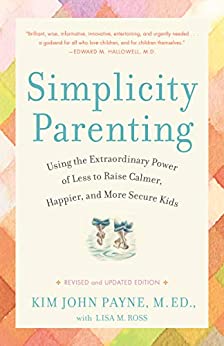More on this book
Community
Kindle Notes & Highlights
Read between
June 13, 2016 - August 30, 2017
how
In their regularity, Sunday morning pancakes are familiar. But they’re also special: a certain rich smell your child anticipates, but which still catches them by happy surprise as they throw back the covers and head for the kitchen. Unscheduled time has the same effect: It builds depth—layers of meaning and feeling—around activities.
we
Imagine a kid whose very busy schedule looks like a “cropped field,” with rows of activities, classes and sports, places to go and things to do. I worry that such a daily life can sow unexpected seeds. It can establish patterns of behavior and expectation that become ingrained, difficult to alter. So much activity can create a reliance on outer stimulation, a culture of compulsion and instant gratification. What also grows in such a culture? Addictive behaviors. You can see
the shadow of overscheduling in this definition of addiction given by my colleague Felicitas Vogt: “an increasing and compulsive tendency to avoid pain or boredom and replace inner development with outer stimulation.”
After all, the ordinary allows for the exceptional, but not the reverse. Given ordinary opportunities and encouragement, a truly exceptional talent will surface. But interests—even strong interests and abilities—often burn out when they’re pushed too hard, too fast, too young. The drive toward the exceptional leaves many loves and passions in its wake. Loving something for its own sake—not for its potential in fame, glory, or music scholarships—is far from ordinary.
With traveling, summer, and year-round leagues, organized sports for children are getting more complicated, competitive, and demanding. This is what’s known as the “professionalization” of children’s sports, and with it often comes premature specialization. It
used to be that if children were athletic, they might do several sports, for a few months out of the year. Increasingly now, children concentrate on a single sport, working out and joining traveling leagues in the off-season, honing their skills in specialty camps and extra leagues in the summer.
I want to clarify that I’m not against organized sports or martial arts for children; I am against the too-much-of-it, and far-too-young way we’ve embraced it. When I speak of the problems with early sport, I’m referring to children younger than ten or eleven years old who are playing formal team sports or engaged in martial arts and training more than twice a week. My concerns are compounded if the nature of the coaching is forceful or aggressive and if competition routs building friendships and fun.
justifications mainly to avoid one word: no. Often this lack of boundaries speaks to a kind of loneliness. Some parents are so focused on their children, and isolated
from adult friendships, that they seek a more equal, friendship-based relationship from their kids. The little buddy parents often want their children to be adults, or, better still, they themselves want to be children again. There is nothing new, and certainly nothing particular to parents about longing for “the fountain of youth.” The only news is that there are now multibillion-dollar industries catering to these fantasies: selling rhinestone embellished thongs to seven-year-old tweeners and low-rise “gangsta” jeans to adults.


